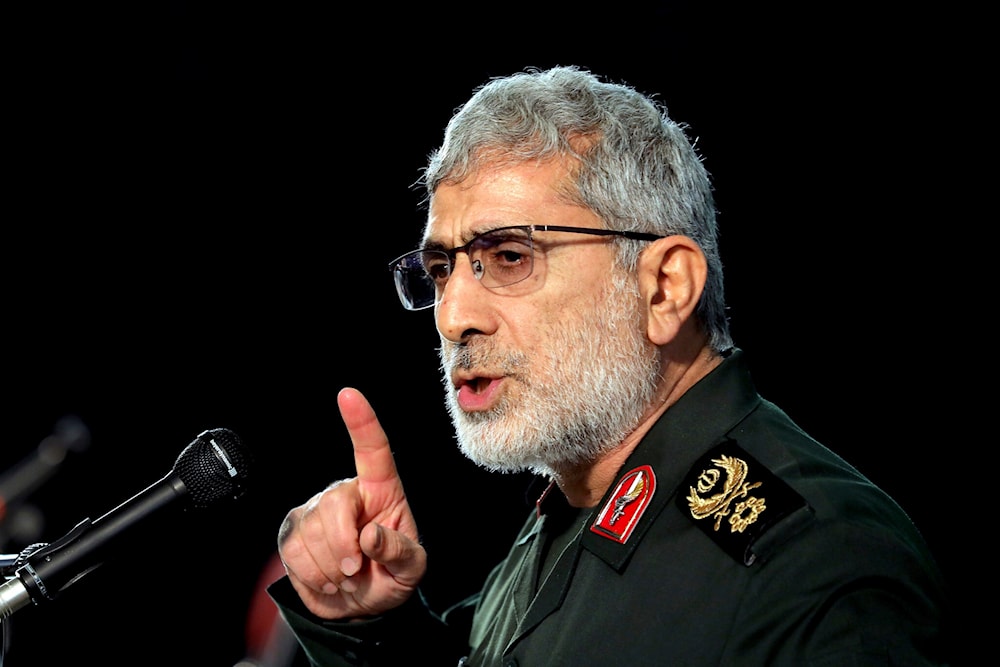IRGC Quds Force commander warns France, Germany, UK
Esmail Qaani vowed that Iran would hold the 3 nations accountable for their defense of "Israel."
-

Esmail Qaani, head of Iran's Quds Force speaks during a ceremony on the occasion of the first anniversary of General Qassem Soleimani in Tehran on January 1, 2021 (AP)
The Commander of the Islamic Revolution Guards Corps' (IRGC) Quds Force issued a stern warning to France, Germany, and the United Kingdom after protecting the Israeli occupation during the Iranian retaliatory operation against it.
On April 13, Iran launched Operation True Promise in retaliation to the Israeli aggression that targeted the Iranian consulate in the Syrian capital Damascus on April 1 and killed seven IRGC advisors.
Brigadier General Esmail Qaani made the comments during a ceremony on Wednesday commemorating the 40th anniversary of Major General Mohammad Hadi Haji Rahimi's martyrdom, one of the martyrs that was targeted in "Israel's" attack on its embassy in Damascus.
Days after the operation, Iranian President Ebrahim Raisi revealed that more than 10 countries attempted, using their technological capabilities, to thwart the operation, but failed, describing that the US, France, and some regional states took part
Qaani described how Operation True Promise, had "special characteristics," that led 7 to 8 vessels and more than 200 aircraft being deployed in the Red Sea to stop the operation.
"The region became the densest point in the world in terms of air defense against our operation, something that one cannot find in history," Qaani expressed.
The commander lambasted the 3 European nations for supporting the Western defense of "Israel" on the night of the operation, vowing that Iran would hold those three countries accountable.
"France, Germany, and Britain, who promised the planes on the night of the True Promise operation, should not think that everything is over and gone, They have to be held to account still," he warned.
He also cautioned the neighboring governments not to rely on Washington for security because they would not receive the same level of backing as "Israel" did.
Iran's Operation True Promise could be repeated: IRGC Commander
Operation True Promise was "the most exceptional decision" made by the Islamic Establishment in Iran, Hossein Salami, the Commander-in-Chief of Iran's Islamic Revolution Guards Corps (IRGC), expressed, warning that the attack could be repeated.
During a ceremony commemorating National Teacher's Day in the country, Salami underscored that the operation symbolized the Iranian people's determination and reflected Iran's "great courage" and "deep wisdom".
He highlighted that it was the first time in decades that a force had shifted the war into the territories occupied by the Israeli entity, adding that "Israel" experienced eight hours of panic, fear, and confusion during the retaliatory attack.
The commander mentioned that Iran, on the one hand, launched Operation True Promise against one target only - the Israeli occupation entity - using a small fraction of Iranian power. But "Israel", on the other hand, used vast geography to intercept Iranian drones and missiles from the Mediterranean and Red Seas, as well as from several countries, including Saudi Arabia, Iraq, Jordan, Turkey, and Greece, and from within occupied Palestine, he noted.
Salami recalled that Tehran carried out the operation without using the element of surprise, meaning that "Israel" already knew the timing of the strikes and the target locations.
He indicated that had Iran executed a second phase of the operation and launched drones and missiles toward the entity, the capability of Israeli defense systems would have decreased by at least 50%.
The IRGC commander attributed the revelation of the Israeli regime's intelligence failure to the Palestinian Resistance's Operation Al Aqsa Flood on October 7, adding that Iran's Operation True Promise further exposed "Israel's" failed deterrence.
Salami commended Iran for emerging victorious and resilient after enduring pressures and sanctions for over four decades.

 4 Min Read
4 Min Read








